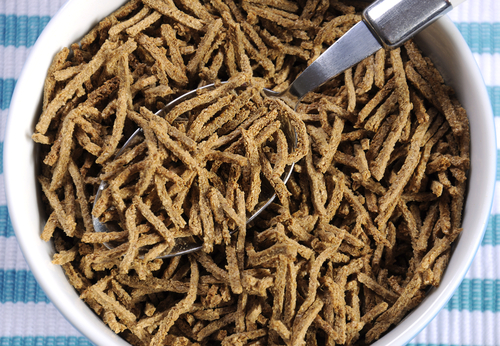Is Fiber Bad For You?
Also Known As: dietary fiber, bulk, roughage
Short answer
Fiber is great for you in the right amounts. Shoot for 25-40g daily.
Very healthy and numerous health benefits. A few harmful qualities may be associated, but only under certain circumstances such as an allergic reaction.
View Full Grading System
Category 'A'
Very healthy and numerous health benefits. Side effects are rare. Things rated an 'A+' are typically necessary for survival (for example, water).
Very healthy and numerous health benefits. A few harmful qualities may be associated, but only under certain circumstances such as an allergic reaction.
Very healthy and numerous health benefits. Harmful qualities may be associated, but aren't usually serious.
It is important to note that even the best things in life can become bad in immoderate amounts. So, although something may be rated an 'A+', overconsumption/overdoing can bring unwanted effects.
Category 'B'
Very beneficial to your health. Things rated a 'B+' may have a few harmful qualities to pay attention to.
Overall beneficial to your health. Things rated a 'B' may have some harmful qualities to pay attention to.
More beneficial to your health than not. However, harmful qualities are most likely associated and shouldn't be overlooked.
The main difference between category 'A' and category 'B' is the harmful qualities typically present in 'B' items. Serious side effects are usually uncommon, but are still possible and should be taken note of.
Category 'C'
Both beneficial and harmful qualities associated. Things rated a 'C+' are typically a bit more on the beneficial side. Still, moderation is important.
A fairly even ratio of beneficial and harmful qualities. Moderation is important. Very general topics that can lean towards both sides of the spectrum will be placed here as well. Rice, for example, can be good or bad depending on the type.
More harmful than beneficial. Side effects are common, especially when consumed/done excessively. Moderation is very important.
Category 'C' usually denotes to both good and bad qualities. When it comes to this category, it is important to keep this word in mind: moderation.
Category 'D'
Harmful to your health. Although benefits may be associated, the bad most likely outweighs the good. Moderation is very important.
Harmful to your health. A few benefits may be associated, but the bad outweighs the good. Moderation is extremely important.
Harmful to your health. Very few, if any, benefits are present. Things in this category should be avoided as much as possible.
Category 'D' is typically for things that are more harmful than beneficial. While consuming/doing something unhealthy once in a blue moon shouldn't hurt, we definitely recommend eliminating 'D' items as a regular part of your routine/diet.
Category 'F'
Category 'F' is for things that fail to bring anything beneficial to the table, and are very harmful to your health. We recommend completely avoiding anything in this category. Long-term side effects of 'F' items are usually very serious.
Category 'N'
'N' stands for neutral. Things placed into this category are generally (a) neither good nor bad for you, or (b) lack the necessary evidence to reach any conclusions.
Long answer
In my medical practice, fiber was a daily recommendation. Dietary fiber includes all parts of plant foods that your body can't digest / absorb. Unlike other food components, such as fats, proteins or carbohydrates — which your body breaks down and absorbs — fiber isn't digested. It passes relatively intact through your stomach, small intestine, large intestine (colon) and out of your body. Fiber helps to remove toxins from your body and is helpful with weight loss.
There are two general types of fiber: soluble and insoluble. Soluble fiber absorbs water and will swell and become a gel-like substance. Soluble fiber has multiple benefits, most importantly helping to lower blood sugar levels (by lowering the absorption of sugar) and assisting in lowering bad cholesterol and triglyceride levels. Studies also demonstrate that soluble fiber is very heart healthy, can help with inflammation and even lower blood pressure.
Good sources of soluble fiber include: oats, oatmeal, legumes (peas, beans, lentils), barley, flaxseed, fruits and veggies. Insoluble fiber does not absorb or dissolve in water. Insoluble fiber offers many benefits to our intestinal health, including a reduction in the risk and occurrence of hemorrhoids, diverticulosis, irritable bowel syndrome and constipation. Good sources of insoluble fiber include: oats, oatmeal, whole wheat flour and wheat bran, nuts, beans and vegetables (such as cauliflower, green beans and potatoes).
Possible short-term side effects
- cramping if overconsumed
-
gas if overconsumed
Benefits
- toxin removal
-
weight loss
-
lower blood sugar
-
lower cholesterol
-
lower triglyceride levels
-
lower blood pressure
-
helps inflammation
-
reduced risk of hemorrhoids, diverticulosis, irritable bowel syndrome and constipation
Please turn your Ad Blocker off to see this content. Thank you!
Thank you for your feedback!
Written by Dr. Becky Maes
Published on: 12-27-2015
Last updated: 11-28-2023
Thank you for your feedback!
Written by Dr. Becky Maes
Published on: 12-27-2015
Last updated: 11-28-2023


 Approved by
Approved by 














